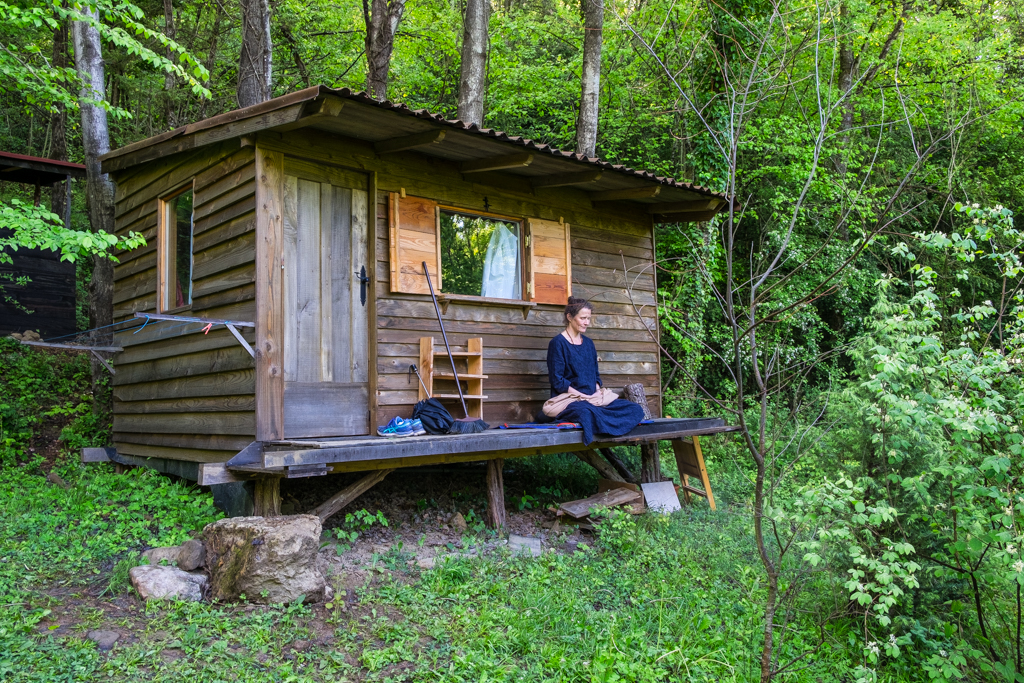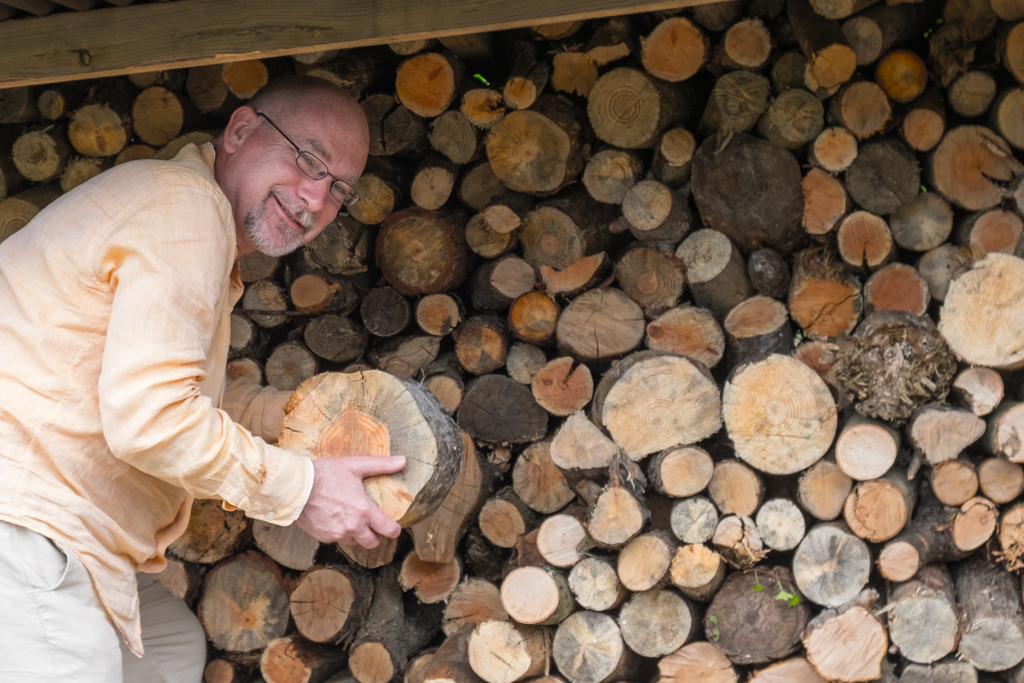Peter Gakudo den Hollander, Sensei | II. Generation > Successor to Tenkei Coppens Roshi

Peter Gakudo den Hollander Sensei (1957, Leiderdorp, the Netherlands) has a bachelor’s degree in social studies and worked with young adults from ethnic minorities in The Hague. He started Zen practice with Genpo Roshi in 1997 and in October 2000 started practicing with Tenkei Roshi, who became his root-teacher. Together with his wife Koren Kasman Sensei, they helped their teachers Tenkei Roshi and Myoho Sensei establishing Zen River – first in Zoetermeer and Holwierde, and from 2002 in its present location in Uithuizen. Gakudo Sensei received Tokudo in 2002 and was Shuso in 2005. In order to meet Soto requirements, he was Shuso again in 2010, with Rev. Junyu Kuroda (Hojo-san) as Jokeshi for his Hossenshiki. In 2012 and 2015 he attended an international Soto Ango in Japan, in Shogoji and Toshoji. He received Shiho in December 2013 from his teacher Tenkei Roshi. From 2008 on he has been leading workshops, classes and sesshins at various locations. He did Zuise in Eiheiji and Sojiji in 2015 (July & April) and is now fully qualified by the Soto School in Japan.
More from the zenriver website:
Peter Gakudo den Hollander has a bachelor’s degree in social studies and worked with young adults from ethnic minorities in The Hague. He started Zen practice with Genpo Roshi in 1997 and did his first sesshin with Tenkei Roshi in 1998. When Tenkei and Myoho Sensei returned to The Netherlands from Japan in the fall of 2000, Gakudo and his wife, Anjo Koren Kasman, became Tenkei’s first Shoken students. In fact, with Roy, a grand, white Pyrenees dog, they all lived together for nine months in Gakudo and Koren’s little house in Zoetermeer and set up a zendo in an old school around the corner. They immediately began searching all over the country for a place to establish Zen River and finally ended up in a beautiful property in Uithuizen. There was much building and maintenance work to do, and Gakudo was the handy-man par excellence right from the start. He received Tokudo in 2002 and was Shuso in 2005. In order to meet Soto requirements, he was Shuso again in 2010. Rev. Junyu Kuroda (Hojo-san) was Jokeshi for this Hossenshiki. In 2012 he attended an international Soto Ango in Shogoji and received Shiho from Tenkei Roshi at Zen River in December 2013. After his second three-month Ango in Japan, this time in Toshoji, he performed the traditional Zuise ceremonies in Eiheiji and Sojiji, which qualify him as a certified Soto priest. Not long after, he and Koren decided to move to the Spanish Pyrenees where Pascal Tetsuko van der Knokke and Emke Gyoen Jutte have a beautiful property and together with them set up a mountain retreat center.

Welcome to Keiryuji
Keiryuji (or Mountain Stream Temple) is a remote Soto Zen-Buddhist hermitage in the Spanish Pyrenees, near the village of Camprodon. It lies in the middle of a protected nature reserve, at 750 meters altitude.
Keiryuji welcomes anyone who wishes to take a break from his or her daily life and dedicate some time to contemplation and reflection. Regardless of spiritual tradition or beliefs, the teacher of Keiryuji will individually guide and support each person throughout their stay.
The abbot or teacher is Gakudo den Hollander Sensei, dharma heir of Tenkei Coppens Roshi (Zen River, the Netherlands) and member of the White Plum Lineage, established by the late Maezumi Roshi in the USA. He is also fully certified by the Japanese Soto school.
…more to come…
Please check in with the Keiryuji’s programme >
Programme
Living a basic lifestyle and being in direct contact with nature in a remote mountain area, naturally the following programme arose. This programme consists of two different but interconnected activities: Personal retreats and Residential training.
Personal retreats
Because Keiryuji can and will only handle a small number of people, every retreat will become a personal retreat. Not only in how they are composed, but also in the daily contact with the teacher.
These retreats are not fixed and they can differ per practitioner. They are composed by teacher and student together, depending on former experience and practice. The final word lies with the teacher.
A few examples of a personal retreat:
Mountain retreat: the mountains that surround us have a big impact on the retreats. Within the Mountain retreat you follow the daily schedule and you have time to do extra zazen or take (silent) hikes in the mornings and afternoons. This can be in the group or by yourself. As soon as the weather allows it we will practice zazen outside as much as possible.
Solo retreat: these retreats are a mix of the solitary retreat and the daily programme. For example starting the day with group meditation and breakfast and ending with a group meditation and dinner. Inbetween there will be a broad variety of possibilities to fill in the personal solo retreat.
Solitary retreat: in this retreat it is important to be by yourself as much as possible. This can be realized in various ways, from staying in a little cabin up to a tent. Food will be provided in a discrete way. There will be regular contact with the teacher; how often will be decided in consultation with the teacher.
Residential training
Residential training can be long-term and short-term. For taking part in the residential training you need to be familiar with Keiryuji. Part of the training is being partly responsible for taking care of the temple and the members who are in retreat. This means that all residents share responsibility for the daily affairs of the temple. For residents, it is mandatory to follow the daily programme and schedule.
Daily Schedule
| 06.30 | zazen (meditation) |
| 07.10 | kinhin (walking meditation) |
| 07.20 | zazen + daisan (private interview with the teacher) |
| 07.50 | kinhin |
| 08.00 | zazen + daisan |
| 08.30 | service (reciting of sutras) |
| 09.15 | breakfast |
| 10.00 | samu (work) |
| 11.30 | coffee & tea break |
| 13.30 | lunch + break |
| 15.45 | samu / sport / study |
| 17.30 | break |
| 18.00 | dinner |
| 19.30 | zazen |
| 20.00 | kinhin |
| 20.10 | zazen |
| 20.40 | kinhin |
| 20.50 | zazen |
| 21.15 | the four vows |
On Monday and Thursday a teisho (dharma talk) will be given.
Please access the Keiryuji website via the link in a new browser window:



